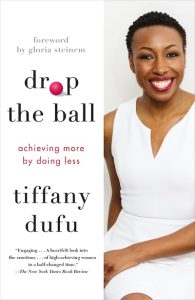by Angela Lovell
 It is only because I am a woman myself that I can get away with saying that women are, oftentimes, their own worst enemy when it comes to ensuring a more equitable distribution of roles and responsibilities on the farm, in the workplace and particularly, in the home.
It is only because I am a woman myself that I can get away with saying that women are, oftentimes, their own worst enemy when it comes to ensuring a more equitable distribution of roles and responsibilities on the farm, in the workplace and particularly, in the home.
While we lament that we take on, and are expected to take on, the lion’s share of household and child-rearing duties, many of us women are, at the same time, reluctant to ask for help, even in some cases believing that delegating those tasks to others, especially the men in our lives, will result in the job not being done right, so it’s easier to just carry on doing them themselves.
American author and speaker, Tiffany Dufu appears to agree with me, and she has even coined a phrase for it: Home Control Disease.
“Most modern women scoff at the idea that a woman’s place is in the home,” Dufu says in her book, Drop the ball: achieving more by doing less (published by Flatiron Books). “Yet, many women still focus obsessively on everything about it – how it’s organized, how it’s managed, and how the cooking, cleaning, and caretaking get done, down to the smallest detail… When it comes to our homes, many women feel a compulsive need to control, to make sure everything is managed in a particular way – our way. I call this home control disease, or HCD, and I know it very well.”
In her book, Dufu, says women need to learn to ‘drop the ball’, focusing on what’s important and not feeling that they have to ‘do it all’ if they want to achieve their true life’s purpose and be happy at work, at home and at play.
Dufu has had a successful, high-profile career in the non-profit sector and is an expert on women’s leadership. She describes how she realized that she was suffering from HDC, and that it was holding her back from achieving her goals and making her truly happy with her life. Dufu’s ‘aha’ moment came after a brainstorming session with her project team at work:
“It occurred to me that women who are successful managers in the workplace abandon best professional practices at home.” she writes.
Dufu now admits she suffered from an extreme case of HCD, even as she struggled to handle the dynamics of juggling her own successful, high-profile career in the non-profit sector, along with her husband’s equally successful career and an infant son and household.
Always striving to be the best at anything she did, Dufu mistook her HDC for many years as just her drive for achievement, but soon realized that she was aiming for a target she could never achieve – perfection in all areas of her life.
While many women suffer from HCD in varying degrees, Dufu believes that much of it has to do with the indoctrination of gender identity from an early age. Girls play with toy kitchens and tea sets while boys play with toy trucks and tractors. This eventually morphs into unrealistic expectations that women put on themselves, and other women pile on too.
“We worry that if things go wrong at home, it will mean we’ve failed as women, because society tells us that to be a successful woman, we need camera-ready kids and a spotless kitchen,” she wrote. “At the same time, we’re not supposed to openly admit that we feel our success as women is connected to our success at home. That would make us weak, or at least old-fashioned. And we are not weak or old fashioned. We are empowered, modern women, right?”
Watch for our next blog post: How to ‘drop the ball’ part two (Introducing MEL) that talks about the system Tiffany Dufu developed to help her change her micromanaging ways and be comfortable with dropping the ball from time to time.
Also read the previous blog in this series: Valuing women’s unpaid work.
This post is adapted from the Country Guide article: The Equitable Farm.




